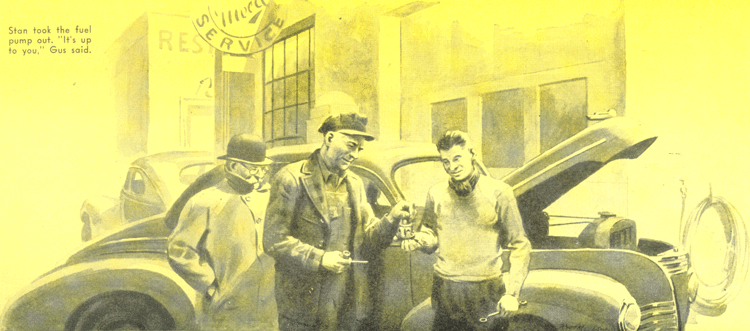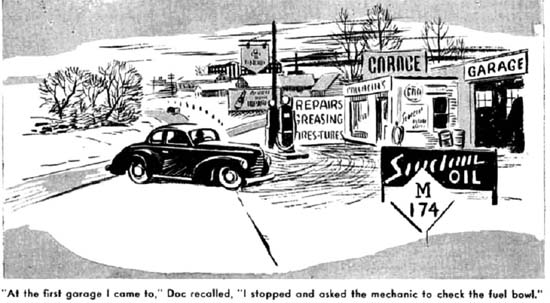January 1946
GUS PLAYS SECOND FIDDLE TO STAN HICKS
by Martin Bunn

Gus Wilson was hard at work on the second morning of the winter's first real cold spell when Doc Marvin came into the Model Garage shop with a worried frown on his normally cheerful face.
"Hello, Doc," Gus greeted him. "Back from the State medical meeting, I see. Have a good time?"
"Yes and no," Doc told him. "Mostly no. I had trouble with my car, and although I handed quite a chunk of coin over to those hijacking garage men up there trying to get it fixed, it's as bad now as it was before they went to work on it. Take a look at it as quickly as you can, will you, Gus? I've got several cases scattered all over the county to attend to this afternoon, and to save my own life I can't get over 30 miles an hour out of the old bus."
"O.K., Doc," Gus agreed. He waved a hand toward the cars crowding the shop floor to capacity. "You can see for yourself what I'm up against today -- but I guess no one needs a car as badly as a doctor does, so I'll slip your job into the No. 1 spot. It isn't often you have car trouble you can't take care of if you have to.
What's the matter with your car, anyway?"
"From some of the symptoms it's displaying," Doc said, "I'd guess that it's this cold weather. But from some of the other symptoms, I'd say I don't know what it is. One of the ways I keep my patients and myself out of most serious trouble is by calling in a specialist for consultation whenever symptoms don't add up to make sense to me. This time you're the specialist."
Gus grinned. "Then go ahead with the consultation," he advised. "I'm listening."
"They've been having even colder weather upstate," Doc told him.
"Night before last it got down close to zero. That didn't bother me -- I knew you had put plenty of antifreeze in my radiator and, anyhow, I had my car safe in the hotel's heated garage.
"The bus was all right until I parked near the hall where the meetings were held. When I came out, it was all wrong -- the engine acted as if it was starved for fuel.
It was sluggish, had no power, and I couldn't get up over 30 in high gear, no matter what I did.
"I figured that probably moisture in the fuel bowl had frozen and was choking the carburetor -- remember how you had to tow me home one bitter-cold night a few winters ago because of that? So at the first garage I came to, I stopped and asked the mechanic to check my fuel bowl. He did. There wasn't any ice in it. Then he checked the entire fuel line -- even the fuel tank. Still no ice.
"About then the boss came over. He scratched his head for a while, and then came up with the opinion that the cold had hardened the lubricant around the spark-advance governor in the distributor so it wouldn't work property. That sounded plausible -- until a check showed that the lubricant hadn't hardened appreciably and that the governor was working normally.
"That made the boss scratch his head some more, and he went into a huddle with the mechanic. They came out of it with another opinion -- that I'd better take my trouble to a carburetor expert down the street. I did, and he said that he knew exactly what it was -- that a richer mixture was needed to give the engine normal power in such cold weather. So he put in larger jets. I paid him for the job -- and before I'd driven a block the trouble had returned.
"Back in the hotel garage, I asked the foreman if he had any idea what could be causing the trouble. He said it might be the fuel pump, and he checked it while I was packing my bags and saying good-by to some of the fellows in the lobby. It was a couple of hours before I was ready to start for home. The foreman was just finishing and said everything was O.K. He was right -- the car ran fine all the way home. It did this morning, too, until after I'd let it stand outside the hospital for three hours. Since then it's been acting up again."
"I'll have a look," Gus said. "Drive her in, Doc. No, never mind -- the floor's too crowded. I'll check it outside." And he started for the door.
"Hold on," Doc called sternly. "You put a coat on. Think I want to have to try to keep you in bed for a week?"
Gus meekly did as ordered.
"There's no doubt about the engine not getting enough fuel," Gus said after he had listened to it for a minute. "The job is to find out why it isn't getting enough."
He got out, raised the hood, removed the cover of the float chamber of the carburetor, saw that the chamber was only half full, and then checked the fuel pump.
"It looks as if your friend at the hotel garage had been on the right track, but he doesn't seem to have followed it far enough," Gus said. "There's something wrong with the fuel pump, all right. Its pressure is just about half what it should be. Stan!" he called, and Stan Hicks, the Model Garage grease monkey and budding young mechanic, came out into the cold air.
"Here's a simple little problem in applied automotive mechanics for you to solve," Gus told him. As directed, Stan took the fuel pump out. "It's up to you," Gus said.
Doc went off in a taxi, and Gus and Stan went back into the shop, taking the fuel pump with them. Stan put it on the bench, but had to take out the wrecker to haul in a frozen car before he could get to work on the pump.
An hour or so later, he took the pump apart, examined and cleaned each part, put it together again, and tested it on the bench.
"Hey, boss," he called. "I've fixed it. The pressure is all right now."
"Good," Gus said, coming over to the bench. "What was the matter?"
Stan looked blank. "I never thought of that. There wasn't anything wrong, I guess. Each part looked O.K. as I was cleaning it. There was one funny thing, though," he recalled. "The diaphragm was wet."
"Wet, was it?" Gus was thoughtful. Then he grinned. "Did you dry it off?"
"Oh, yes," Stan assured him. "But what goes on here, boss? Why was the pump bad when you checked it and all right after all I did was to take it apart and put it together again? It doesn't make sense."
"Yes, it does -- if you throw in the fact that you took the wrecker out between the time you brought the pump in from Doc's car and the time you took it apart," Gus told him. "Results are what they pay off on, kid, and you got 'em -- no matter how. It could be that you're a genius without knowing it." He gave Stan a friendly shove.
"Put Doc's pump back in, and then apply your talents to one of these other jobs."
Doc Marvin hustled into the shop on the stroke of two. "I'm in a rush!" he called from the doorway. "Emergency call! Did you get the pump fixed, Gus?"
"Stan did," Gus told him. "He's good, Doc. In just an hour he'd diagnosed and cured a car ailment that is one of the toughest of any to spot. I just played second fiddle. But I'll tell you about it when you have more time. Your bus is outside, ready to roll."
"Good for you, Stan," Doc said hurriedly.
He sped away to answer the emergency call.
Stan scowled at his employer. "I don't mind being kidded when we're alone," he said, "but I don't think it's right in front of the customers."
"That wasn't kidding, Stan," Gus smiled.
"Far from it. You did a real job. Of course, you don't know how you did it, but that happens to the best mechanics, and I'm not going to tell Doc that part of the story. What I was doing was building you up with the customer."
"Maybe I need building up with some of our customers," Stan grinned. "What was the matter with the pump, anyway?"
"You really should know," Gus said. "Remember that you went out with the wrecker after you'd brought the pump into the shop and didn't disassemble the pump until you got back about an hour later? That hour's wait in the warm shop was the cure, along with your wiping the wet diaphragm dry.
"If you had started on the pump as soon as you had it in the shop, you would have found ice on the diaphragm -- enough to restrict its action. It's lucky the ice didn't puncture it -- that can happen.
"Accumulated condensation inside the fuel pump was the underlying cause of the trouble, and when this cold weather came, the condensation froze. Of course, after the car had stood in a heated garage for a while, the ice melted, and the pump checked all right -- the way it did in Doc's hotel garage -- and there was nothing to show what had been causing the trouble.
"If you hadn't been smart enough to notice that the diaphragm was wet, we'd probably be trouble-shooting the job yet. Nice work, Stan -- and I'm not kidding."
END
L. Osbone 2019
